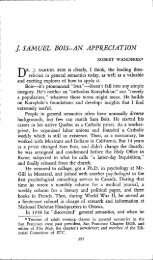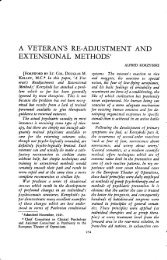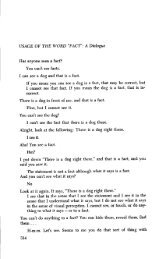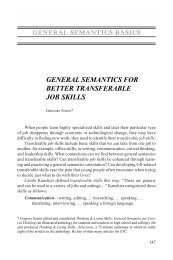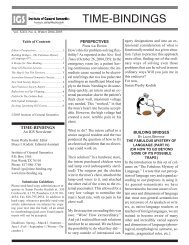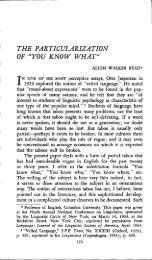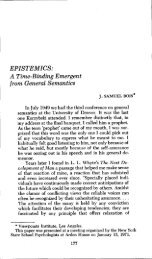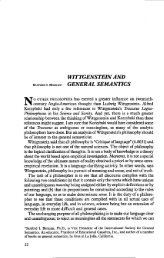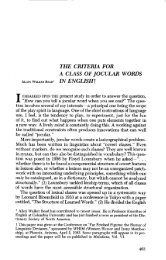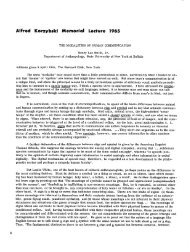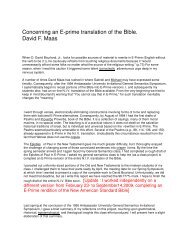here - The Institute of General Semantics
here - The Institute of General Semantics
here - The Institute of General Semantics
Create successful ePaper yourself
Turn your PDF publications into a flip-book with our unique Google optimized e-Paper software.
THE INSTITUTE OF GENERAL SEMANTICS<br />
56 TH ANNUAL<br />
ALFRED KORZYBSKI<br />
MEMORIAL LECTURE<br />
AND THE SYMPOSIUM<br />
CREATING THE FUTURE:<br />
CONSCIOUS TIME-BINDING<br />
FOR A BETTER TOMORROW<br />
FRIDAY 14 THROUGH SUNDAY 16<br />
NOVEMBER 2008<br />
THE PRINCETON CLUB<br />
FORDHAM UNIVERSITY<br />
LINCOLN CENTER CAMPUS<br />
NEW YORK CITY<br />
CO-SPONSORED BY<br />
THE INSTITUTE OF GENERAL SEMANTICS<br />
THE NEW YORK SOCIETY FOR GENERAL SEMANTICS<br />
THE MEDIA ECOLOGY ASSOCIATION<br />
THE LI FWYNN FOU NDATI ON FOR SOCIAL RESEARCH<br />
FRIENDS OF THE INSTITUTE OF NOETIC SCIENCES<br />
FORDHAM U NIVERSITY’S DEP ARTMENT OF<br />
COMMUNICATI ON AND MEDI A STU DIES
THE INSTITUTE OF GENERAL SEMANTICS<br />
CELEBRATING 70 YEARS IN 2008<br />
THE INSTITUTE OF GENERAL SEMANTICS<br />
http://www.generalsemantics.org<br />
EXECUTIVE DIRECTOR, Lance Strate<br />
EDITOR, ETC: A REVIEW OF GENERAL SEMANTICS, Bill Petkanas<br />
WEBMASTER, Ben Hauck<br />
OFFICE MANAGER, Judith Clarke<br />
GRADUATE ASSISTANT, Pamela Miller<br />
BOARD OF TRUSTEES<br />
PRESIDENT, Martin H. Levinson<br />
VICE-PRESIDENT/TREASURER, Jacqueline J. Rudig<br />
SECRETARY, Vanessa Biard-Schaeffer<br />
AMBASSADOR AT LARGE, Milton Dawes<br />
Corey Anton<br />
George J. Barenholtz<br />
Walter W. Davis<br />
Allen Flagg<br />
Thom Gencarelli<br />
Irene S. Ross Mayper<br />
Gerard I. Nierenberg<br />
Frank Scardilli<br />
Lynn E. Schuldt<br />
HONORARY TRUSTEES<br />
Sanford Berman<br />
Harry Maynard<br />
ORGANIZING COMMITTEE<br />
Annemarie Colbin, Milton Dawes, Allen Flagg, Lloyd Gilden, Ben Hauck,<br />
Martin H. Levinson, Irene S. Ross Mayper, Jacqueline J. Rudig, Lance Strate<br />
WITH SPECIAL THANKS TO:<br />
James VanOosting, Edward A. Wachtel, Bruce Kodish, Robert Francos,<br />
Roberta Palmerio, David Coiro, Gabriella Loutfi, Doug Petrullo, James Page<br />
THE INSTITUTE OF GENERAL SEMANTICS<br />
1
THE ALFRED KORZYBSKI<br />
MEMORIAL LECTURE<br />
THE PRINCETON CLUB OF NEW YORK<br />
15 WEST 43 RD STREET (BETWEEN 5 TH AND 6 TH AVENUES) NEW YORK 10036<br />
FRIDAY, NOVEMBER 14, 2008<br />
6:00 PM DINNER<br />
8:00 PM PROGRAM<br />
Moderator: Lance Strate – Executive Director <strong>of</strong> the <strong>Institute</strong> <strong>of</strong> <strong>General</strong> <strong>Semantics</strong>, President <strong>of</strong><br />
the Media Ecology Association – Fordham University<br />
PRESENTATION OF THE J.TALBOT WINCHELL AWARD<br />
Martin H. Levinson – President <strong>of</strong> the <strong>Institute</strong> <strong>of</strong> <strong>General</strong> <strong>Semantics</strong>, Vice-President <strong>of</strong> the New York<br />
Society for <strong>General</strong> <strong>Semantics</strong><br />
Allen Flagg – Trustee <strong>of</strong> the <strong>Institute</strong> <strong>of</strong> <strong>General</strong> <strong>Semantics</strong>, President <strong>of</strong> the New York Society for<br />
<strong>General</strong> <strong>Semantics</strong><br />
THE FIFTY-SIXTH ANNUAL ALFRED KORZYBSKI MEMORIAL<br />
LECTURE<br />
Playing the Future: Towards a Creative Society<br />
Douglas Rushk<strong>of</strong>f – New York University<br />
FRIDAY NOVEMBER 14 THRU<br />
SUNDAY NOVEMBER 22,<br />
2008<br />
2<br />
At IGS Seminar at NYU, Feb. 1945.<br />
M. Kendig standing, Mrs. Mario n Harp er at recorder.<br />
THE INSTITUTE OF GENERAL SEMANTICS
<strong>The</strong> Trustees <strong>of</strong><br />
<strong>The</strong> <strong>Institute</strong> <strong>of</strong> <strong>General</strong> <strong>Semantics</strong><br />
Present<br />
THE 2008 J. TALBOT WINCHELL<br />
AWARD<br />
to<br />
ALLEN FLAGG<br />
In Recognition <strong>of</strong> His Lifelong<br />
Service, Accomplishments and<br />
Time-binding Efforts<br />
November 14, 2008<br />
New York City<br />
THE INSTITUTE OF GENERAL SEMANTICS<br />
3
THE ALFRED KORZYBSKI MEMORIAL LECTURERS<br />
1952 William Vogt<br />
M.F. Ashley Montagu<br />
1953 F. J. Roethlisberger<br />
1954 F. S. C. Northrop<br />
1955 R. Buckminster Fuller<br />
1956 Clyde Kluckhohn<br />
1957 Abraham Maslow<br />
1958 Russell Meyers<br />
1959 William J. Fry<br />
James A. Van Allen<br />
Charles M. Pomerat<br />
1960 Warren S. Mcculloch<br />
1961 Robert R. Blake<br />
1962 Harold G. Cassidy<br />
1963 Henri Laborit<br />
1964 Joost A. M. Meerloo<br />
1965 Henry Lee Smith, Jr.<br />
1966 Alvin M. Weinberg<br />
1967 J. Bronowski<br />
1968 Alastair M. Taylor<br />
1969 Lancelot Law Whyte<br />
1970 Gregory Bateson<br />
1971 Henry Margenau<br />
1972 George Steiner<br />
1973 J. Samuel Bois<br />
Elton S. Carter<br />
Walter Probert<br />
1974 Kenneth G. Johnson<br />
Neil Postman<br />
1975 Harley C. Shands<br />
1976 Roger W. Wescott<br />
1977 Ben Bova<br />
1978 Elwood Murray<br />
1979 Don Fabun<br />
1980 Barbara Morgan<br />
1981 Thomas Sebeok<br />
1982 Robert R. Blake<br />
1983 Allen Walker Read<br />
1984 Karl H. Pribram<br />
1985 Russell Meyers<br />
1986 George F.F. Lombard<br />
1987 Richard W. Paul<br />
1988 Jerome Bruner<br />
1989 William V. Haney<br />
1990 Warren M. Robbins<br />
1991 Albert Ellis<br />
1992 Steve Allen<br />
1993 William Lutz<br />
1994 Lotfi A. Zadeh<br />
1995 Nicholas Johnson<br />
1996 Mihaly Csikszentmihalyi<br />
1997 Robert Anton Wilson<br />
1998 <strong>The</strong>odore R. Sizer<br />
1999 Ellen J. Langer<br />
2000 Robert P. Pula<br />
2001 Lou Marin<strong>of</strong>f<br />
2002 J. Allan Hobson<br />
2003 Sanford I. Berman<br />
2005 Robert L. Carneiro<br />
2006 Renee Hobbs<br />
2007 Leonard Shlain<br />
2008 Douglas Rushk<strong>of</strong>f<br />
4 THE INSTITUTE OF GENERAL SEMANTICS
ANNOUNCING<br />
THE INAUGURATION OF THE<br />
INSTITUTE OF GENERAL SEMANTICS<br />
SAMUEL I. HAYAKAWA BOOK PRIZE<br />
Competition for the Hayakawa Book Prize is open to any book published in 2004 or later on topics<br />
and themes <strong>of</strong> direct relevance to the discipline <strong>of</strong> general semantics, including time-binding,<br />
abstraction, language, symbols, meaning, communication, media, perception, consciousness,<br />
epistemology, scientific method, etc.<br />
To enter, send a letter <strong>of</strong> nomination and four copies <strong>of</strong> the book to Executive Director,<br />
<strong>Institute</strong> <strong>of</strong> <strong>General</strong> <strong>Semantics</strong>, 2260 College Avenue, Fort Worth, TX 76110 by March 1,<br />
2009.<br />
For more information, contact Lance Strate, Executive Director <strong>of</strong> the <strong>Institute</strong> <strong>of</strong> <strong>General</strong><br />
<strong>Semantics</strong>, via e-mail executivedirector@generalsemantics.org, or by telephone at<br />
718.817.4864.<br />
THE WINNER WILL RECEIVE A CASH AWARD OF<br />
$1,000<br />
http://www.generalsemantics.org<br />
THE INSTITUTE OF GENERAL SEMANTICS<br />
5
SYMPOSIUM<br />
CREATING THE FUTURE:<br />
CONSCIOUS TIME-BINDING FOR A BETTER TOMORROW<br />
FORDHAM UNIVERSITY, LINCOLN CENTER CAMPUS<br />
SATURDAY, NOVEMBER 15, 2008<br />
8:30 AM BREAKFAST AND REGISTRATION<br />
Fordham Law Building, West 62 nd Street and Columbus Avenue<br />
MORNING SESSION IN MCNALLY AUDITORIUM<br />
Moderators:<br />
Lance Strate – Fordham University<br />
Jacqueline Rudig – <strong>Institute</strong> <strong>of</strong> <strong>General</strong> <strong>Semantics</strong><br />
Martin H. Levinson – <strong>Institute</strong> <strong>of</strong> <strong>General</strong> <strong>Semantics</strong><br />
9-9:30 AM Beyond iCelebrities: Social Networking and Social Activism on the Internet<br />
Kathleen Sweeney – <strong>The</strong> New School<br />
9:30-10 AM Rhetorical Overload<br />
David Berreby – <strong>Institute</strong> <strong>of</strong> <strong>General</strong> <strong>Semantics</strong><br />
10-10:30 AM Mediation and Fusion: <strong>The</strong> Case <strong>of</strong> Barack Obama<br />
Tom de Zengotita – New York University, <strong>The</strong> Dalton School<br />
10:30-11 AM Why We Hate Us: American Discontent in the New Millennium<br />
Dick Meyer – National Public Radio<br />
11-11:30 AM What Every Thinking Person Should Know About Law, Lawyers and the Tyranny <strong>of</strong> Illusion<br />
Frank Scardilli – <strong>Institute</strong> <strong>of</strong> <strong>General</strong> <strong>Semantics</strong><br />
11:30 AM-12 Glut: Mastering Information through the Ages<br />
Alex Wright – <strong>The</strong> New York Times<br />
12-12:30 PM What is a Sp<strong>here</strong>?: Metapatterns and Scale-Transcending Functional Principles<br />
Tyler Volk – New York University<br />
12:30-1 PM What Did Alfred Want? A Biographer's Notes on Korzybski's Life and Work<br />
Bruce Kodish – <strong>Institute</strong> <strong>of</strong> <strong>General</strong> <strong>Semantics</strong><br />
6 THE INSTITUTE OF GENERAL SEMANTICS
SATURDAY, NOVEMBER 15, 2008<br />
1-2:30 PM LUNCH BREAK<br />
AFTERNOON SESSIONS HELD SIMULTANEOUSLY IN MCNALLY AUDITORIUM AND MCMAHON HALL LOUNGE<br />
McMahon Hall is located at 155 West 60 th Street, between Columbus and Amsterdam Avenues<br />
2:30 – ACTIVISM AS CONSCIOUS TIME-BINDING<br />
3:45 PM Moderator: David Linton – Marymount Manhattan College<br />
McNally<br />
Consciousness Without Activism is Ceding the Future<br />
Jeanne Posner – Western Connecticut State University<br />
Social Networking and the Campaign Against Astroturfing<br />
Paull Young – Converseon<br />
Empowerment <strong>of</strong> Women in Africa: <strong>The</strong> Role <strong>of</strong> Media Technology<br />
Bosco Ebere Amakwe – HFSN, Seton Hall University<br />
Post 9/11 Health Crisis: Reactions <strong>of</strong> the Whole Organism, Delayed Reaction <strong>of</strong> the Culture<br />
Donna Flayhan – State University <strong>of</strong> New York, New Paltz<br />
2:30 – ON THE LOGIC AND ILLOGIC OF SYMBOLS<br />
3:45 PM Moderator: Margot Hardenbergh – Fordham University<br />
McMahon<br />
Visual Propositions<br />
Gerald Erion – Medaille College<br />
Deleting “I,” Updating “We”<br />
Philip Ardery – Louisville (KY) Sustainability Forum<br />
Language, Dao, Etc<br />
Zhenbin Sun – Fairleigh Dickinson University<br />
Practical Fairy Tales for Everyday Living<br />
Martin H. Levinson – <strong>Institute</strong> <strong>of</strong> <strong>General</strong> <strong>Semantics</strong><br />
4:00 – DISPATCHES FROM THE GLOBAL VILLAGE<br />
5:15 PM Moderator: Robert Albrecht – New Jersey City University<br />
McNally<br />
A New French President, Nicolas Sarkozy<br />
Vanessa Biard-Schaeffer – <strong>Institute</strong> <strong>of</strong> <strong>General</strong> <strong>Semantics</strong><br />
<strong>General</strong> <strong>Semantics</strong> in India<br />
Prafulla Kar – Director, Centre for Contemporary <strong>The</strong>ory and <strong>General</strong> <strong>Semantics</strong>, Baroda, India<br />
<strong>The</strong> Epistemoscope: From Time-Binding to Space-Minding<br />
Devkumar Trivedi – Centre for Contemporary <strong>The</strong>ory and <strong>General</strong> <strong>Semantics</strong>, Baroda, India<br />
In Praise <strong>of</strong> Delayed Reactions: Israel and the Culture <strong>of</strong> Talkbacks<br />
Eva Berger – School <strong>of</strong> Media Studies, <strong>The</strong> College <strong>of</strong> Management, Israel<br />
THE INSTITUTE OF GENERAL SEMANTICS<br />
7
SATURDAY, NOVEMBER 15, 2008<br />
4:00 – THE CONTENTS AND DISCONTENTS OF THE NEW MEDIA ENVIRONMENT<br />
5:15 PM Moderator: Paul Lippert – East Stroudsburg University<br />
McMahon<br />
Why We Need Cyberspace: A Response to Neil Postman’s Essay “Cyberspace, Shmyberspace”<br />
Mary Ann Allison – H<strong>of</strong>stra University<br />
Navigating Life in the Age <strong>of</strong> Google and Garmin: Answers and Directions vs. Wonder and Mystery<br />
Robert Berkman – <strong>The</strong> New School<br />
Crazy Talk, Stupid Talk: Revisiting Postman and the Relational Dynamics in the Emergent Semantic<br />
Environment <strong>of</strong> 21 st Century Digital Media<br />
Stephanie Bennett – Palm Beach Atlantic University<br />
Creating a Civil Culture: <strong>The</strong> Need to Resist Trash Talk in Contemporary Media<br />
Janet Sternberg – Fordham University<br />
EVENING SESSION IN MCNALLY AUDITORIUM<br />
Moderators:<br />
Allen Flagg – <strong>Institute</strong> <strong>of</strong> <strong>General</strong> <strong>Semantics</strong><br />
Janet Sternberg – Fordham University<br />
5:30-6 PM <strong>The</strong> Green Flaneur<br />
Paul Guzzardo – <strong>The</strong> Geddes <strong>Institute</strong> for Urban Research<br />
David Walczyk – <strong>The</strong> Pratt <strong>Institute</strong><br />
Alicia Gibb – NYC Resistors and Bug Labs<br />
6-6:30 PM How to Live in the 21st Century Without Multi-Tasking<br />
Andrew Postman – Media Ecology Association<br />
6:30-7 PM <strong>General</strong> <strong>Semantics</strong> Writ Large<br />
Terence P. Moran – New York University<br />
7-7:30 PM Tools for Creating Better Futures<br />
Milton Dawes – <strong>Institute</strong> <strong>of</strong> <strong>General</strong> <strong>Semantics</strong><br />
8 THE INSTITUTE OF GENERAL SEMANTICS
SUNDAY, NOVEMBER 16, 2008<br />
ALL SESSIONS IN MCMAHON HALL LOUNGE<br />
8:30 AM BREAKFAST AND REGISTRATION<br />
9:00 – MEDIA FUTURES<br />
10:15 AM Moderator: Brian Cogan – Molloy College<br />
<strong>The</strong> End <strong>of</strong> Intellectual Property<br />
Thom Gencarelli – Manhattan College<br />
Things Come in Fours<br />
Robert Blechman – St. George's University<br />
<strong>The</strong> Umbilical Cord: Corrections, Connections and the Role <strong>of</strong> Media in America's Prisons<br />
Jessica K. Crowell – Fordham University<br />
10:30 – SCIENCE FICTION: SEQUELS AND ADAPTATIONS<br />
12:00 PM Moderator: Meir Ribalow – Fordham University<br />
Null – A Continuum<br />
John C. Wright – Tor Books<br />
12-1:30 PM LUNCH BREAK<br />
Science Fiction Tells Us Why the Obama Family is a Sequel to <strong>The</strong> Cosby Show<br />
Marleen Barr – Fordham University<br />
From the Page to the Screen<br />
Paul Levinson – Fordham University<br />
1:30 – MULTIMEDIA PERFORMANCE<br />
2:45 PM Moderator: Jacqueline Rudig – <strong>Institute</strong> <strong>of</strong> <strong>General</strong> <strong>Semantics</strong><br />
Thus Spoke the Spectacle<br />
Eric Goodman – <strong>Institute</strong> <strong>of</strong> <strong>General</strong> <strong>Semantics</strong><br />
THE INSTITUTE OF GENERAL SEMANTICS 9
SUNDAY, NOVEMBER 16, 2008<br />
3:00 – TEACHING GENERAL SEMANTICS<br />
4:15 PM Moderator: Margaret Cassidy – Adelphi University<br />
Frank Gastner – <strong>Institute</strong> <strong>of</strong> <strong>General</strong> <strong>Semantics</strong><br />
Renée Cherow-O'Leary – Teachers College, Columbia University<br />
William Petkanas – Western Connecticut State University<br />
4:30 – THE FUTURE OF GENERAL SEMANTICS<br />
5:45 PM Moderator: Vanessa Biard Schaeffer – <strong>Institute</strong> <strong>of</strong> <strong>General</strong> <strong>Semantics</strong><br />
A Better Tomorrow for <strong>General</strong> <strong>Semantics</strong><br />
Ben Hauck – <strong>Institute</strong> <strong>of</strong> <strong>General</strong> <strong>Semantics</strong><br />
Development <strong>of</strong> the Ability to Experience Greater Integration with the Environment<br />
Lloyd Gilden – Lifwynn Foundation for Social Research<br />
Time-binding, Yes! But Time-bound, No! Change is Universal, But So Is Stability<br />
Hillel Schiller – <strong>Institute</strong> <strong>of</strong> <strong>General</strong> <strong>Semantics</strong><br />
Con II: <strong>The</strong> Future <strong>of</strong> Consciousness<br />
Allen Flagg – <strong>Institute</strong> <strong>of</strong> <strong>General</strong> <strong>Semantics</strong><br />
10 THE INSTITUTE OF GENERAL SEMANTICS
ABOUT THE PARTICIPANTS<br />
Robert Albrecht is the author <strong>of</strong> numerous articles on the relationship <strong>of</strong> media and culture in both Latin America<br />
and <strong>here</strong> in the United States. Albrecht is the recipient <strong>of</strong> an Organization <strong>of</strong> American States Fellowship for study in<br />
Brazil as well as the Carlos Vigil Prize for his publications in Latin American popular culture. While a doctoral student in<br />
the Media Ecology program at New York University, he served as Arts Editor to ETC. He worked for several years as a<br />
music and drama workshop leader with children in Jersey City public schools. Albrecht currently serves on the editorial<br />
board <strong>of</strong> several communication journals and teaches theory and media history courses in the Media Arts Department<br />
at New Jersey City University in Jersey City. His book, Mediating the Muse (Hampton Press, 2004) was the winner <strong>of</strong> the<br />
Dorothy Lee Award for outstanding scholarship in the area <strong>of</strong> cultural ecology.<br />
Mary Ann Allison is an interdisciplinary scholar at H<strong>of</strong>stra University who uses media theory, sociology, and complex<br />
systems theory to study the ways in which individuals, communities, and institutions are changing. In addition to<br />
teaching Media Studies in the School <strong>of</strong> Communication, she conducts research for the H<strong>of</strong>stra University National<br />
Center for Suburban Studies and the Urban Communication Foundation. Her study <strong>of</strong> social evolution won the Media<br />
Ecology Association's 2005 Harold A. Innis Award for Outstanding Dissertation in the field <strong>of</strong> Media Ecology.<br />
Sister Dr. Bosco Ebere Amakwe, HFSN finished a PhD program in Communication (affiliating to the Department<br />
<strong>of</strong> Social Sciences) in June, 2006 from the Pontifical Gregorian University in Rome. Her dissertation, <strong>of</strong> which excerpts<br />
were published, is "<strong>The</strong> Factors Influencing the Mobility <strong>of</strong> Women to Leadership and Management Positions in Media<br />
Industries in Nigeria." She specialized in gender studies and interpersonal communication. Sister Dr. Amakwe is an<br />
Assistant Pr<strong>of</strong>essor in the Department <strong>of</strong> Communication at Seton Hall University, New Jersey.<br />
Phil Ardery joined the <strong>Institute</strong> <strong>of</strong> <strong>General</strong> <strong>Semantics</strong> in 1974, after reading Science and Sanity one-and-a-half times<br />
and attending a summer seminar-workshop whose instructional staff included Charlotte Read and Robert Pula. <strong>The</strong><br />
New York Society for <strong>General</strong> <strong>Semantics</strong> elected Phil to its Board <strong>of</strong> Directors in 2007. In Kentucky, aside from<br />
exercising his trade as a specialist in Electronic Data Interchange, Phil helps steer the Louisville Sustainability Forum<br />
and has co-founded a local chapter <strong>of</strong> the Green Party USA (www.greenparty.org). Phil holds degrees from Harvard<br />
College and New York University.<br />
Marleen S. Barr is known for her pioneering work in feminist science fiction theory and teaches in the Department <strong>of</strong><br />
Communication and Media Studies at Fordham University. She has won the Science Fiction Research Association Pilgrim<br />
Award for lifetime achievement in science fiction criticism. Barr is the author <strong>of</strong> Alien to Femininity: Speculative Fiction<br />
and Feminist <strong>The</strong>ory, Lost in Space: Probing Feminist Science Fiction and Beyond, Feminist Fabulation:<br />
Space/Postmodern Fiction, and Genre Fission: A New Discouse Practice for Cultural Studies. She has edited many<br />
anthologies, authored the novel Oy Pioneer!, and co-edited the special science fiction issue <strong>of</strong> PMLA.<br />
THE INSTITUTE OF GENERAL SEMANTICS 11
ABOUT THE PARTICIPANTS<br />
Stephanie Bennett is Associate Pr<strong>of</strong>essor <strong>of</strong> Communication and Media Studies at Palm Beach Atlantic University,<br />
West Palm Beach, Florida, w<strong>here</strong> she enjoys teaching and continuing research in the area <strong>of</strong> media ecology, philosophy<br />
<strong>of</strong> communication, and the church and culture. Dr. Bennett has been interacting on Internet discussion lists since the<br />
early 1990's, enjoys Facebook in small doses, and invites dialogue at steffasong@aol.com. She and her husband, Earl,<br />
make their home in Palm Springs, Florida.<br />
Dr. Eva Berger is the Dean <strong>of</strong> the School <strong>of</strong> Media Studies <strong>of</strong> the College <strong>of</strong> Management - Academic Studies Division<br />
- in Israel. She is also consultant to public and private organizations, and has written various programs for the study <strong>of</strong><br />
Communication in Israel's elementary and high school systems. Eva served as a member <strong>of</strong> the Israel Film Council for<br />
six years, is an advisor to Israel's Educational Television and Commentator on media matters for Israel's various daily<br />
newspapers, radio and television stations. She holds a BA in Film and Television from Tel Aviv University, and an MA<br />
and PhD in Media Ecology from New York University.<br />
Robert Berkman is an Associate Pr<strong>of</strong>essor in the Media Studies program at the New School w<strong>here</strong> he has taught<br />
since 1996. He is also the editor <strong>of</strong> <strong>The</strong> Information Advisor, a monthly journal he founded in 1988 for pr<strong>of</strong>essional<br />
researchers. He has authored several books on research, technology, the media, and ethics. Robert Berkman lives in<br />
Rochester New York.<br />
David Berreby's book, Us and <strong>The</strong>m: <strong>The</strong> Science <strong>of</strong> Identity won the 2006 Erving G<strong>of</strong>fman Award for Outstanding<br />
Scholarship from the Media Ecology Association. A paperback edition was published in October, 2008 by the University<br />
<strong>of</strong> Chicago Press. Berreby, an independent writer and researcher, has written for <strong>The</strong> New Yorker, the New York Times<br />
Magazine, Smithsonian, <strong>The</strong> New Republic, Slate, Lingua Franca and many other publications. His website can be found<br />
at .<br />
Vanessa Biard-Schaeffer is a French-American, third generation <strong>General</strong> Semanticist. Graduated in Linguistics<br />
(Paris 10), Management (Solvay School), and Coaching (Paris 8), Vanessa represents the <strong>Institute</strong> <strong>of</strong> <strong>General</strong><br />
<strong>Semantics</strong> in Paris, France. She has been working in politics, at local and European levels, and is currently running her<br />
own company.<br />
Robert Blechman, an experienced information technology executive, is currently Associate Director in the Office <strong>of</strong><br />
Information Technology at St. George's University. He has held senior technology positions at Columbia University<br />
Medical Center, the New York City Board <strong>of</strong> Education, PricewaterhouseCoopers, HarperCollins Publishers and CBS. As<br />
an adjunct pr<strong>of</strong>essor at Fordham University, he taught courses in communication theory, mass media and society and<br />
media industries. He has a PhD in Media Ecology and a Finance MBA, both from New York University. His doctoral<br />
research concerned the impact <strong>of</strong> television advertising on our culture, and he discusses media ecological musings and<br />
speculations in his blog, "A Model Media Ecologist" which can be found at www.robertkblechman.blogspot.com.<br />
12 THE INSTITUTE OF GENERAL SEMANTICS
ABOUT THE PARTICIPANTS<br />
Margaret Cassidy is an Associate Pr<strong>of</strong>essor at Adelphi University, w<strong>here</strong> she has been Chair <strong>of</strong> the Communications<br />
Department for seven years. Her research focuses primarily on issues related to media, children, and K-12 education.<br />
She is the author <strong>of</strong> Bookends: <strong>The</strong> Changing Media Environment <strong>of</strong> American Classrooms.<br />
Dr. Renee Cherow-O'Leary is a Pr<strong>of</strong>essor <strong>of</strong> English Education at Teachers College, Columbia University. She is a<br />
member <strong>of</strong> the Media Commission <strong>of</strong> the National Council <strong>of</strong> Teachers <strong>of</strong> English and is President <strong>of</strong> Education for the<br />
21st Century, a New York consulting group that develops educational materials and curriculum in multiple platforms for<br />
children's, school and family media. Renee recently was a Visiting Scholar at Harvard w<strong>here</strong> she studied arts and<br />
technologies in education, literary theory and entrepreneurship and education reform. She was formerly a Director <strong>of</strong><br />
Research at the Children's Television Workshop, National Coordinator <strong>of</strong> Creating Critical Viewers, a media literacy<br />
program for the National Academy <strong>of</strong> Television Arts and Sciences. Renee presents at many educational conferences<br />
on literacy, language and 21st century literacies.<br />
Dr. Brian Cogan is an Associate Pr<strong>of</strong>essor <strong>of</strong> Communication Arts and Sciences at Molloy College in Long Island,<br />
New York. He is the author, co-author and co-editor <strong>of</strong> numerous books, articles and anthologies on popular culture,<br />
music and the media. His specific areas <strong>of</strong> research interest are punk rock, comic books, media ecology and the<br />
intersection <strong>of</strong> politics and popular culture. He is the author <strong>of</strong> <strong>The</strong> Punk Rock Encyclopedia (Sterling 2008), co-author<br />
with Tony Kelso <strong>of</strong> <strong>The</strong> Encyclopedia <strong>of</strong> Popular Culture, Media and Politics (Greenwood Press 2008) as well as coeditor<br />
with Tony Kelso on an anthology from Lexington Press, Mosh the Polls: Youth Voters, Popular Culture, and<br />
Democratic Engagement (Lexington 2008), about youth culture and political involvement. Dr. Cogan is also the coauthor,<br />
along with William Phillips, <strong>of</strong> the Encyclopedia <strong>of</strong> Heavy Metal Music and Culture (Greenwood Press 2009). He<br />
has also written about these topics for publications such as the New York Post, Chunklet, Go Metric, Punknews.org and<br />
Muze.com. He is currently working on a new project, a history <strong>of</strong> punk in film over the last thirty years.<br />
Jessica Crowell is a New York-based writer, policy analyst, and former graduate assistant for the Donald McGannon<br />
Communication Research Center at Fordham University.<br />
THE INSTITUTE OF GENERAL SEMANTICS 13
ABOUT THE PARTICIPANTS<br />
Milton Dawes is a Trustee and Ambassador-At-Large <strong>of</strong> the <strong>Institute</strong> <strong>of</strong> <strong>General</strong> <strong>Semantics</strong>, having been a<br />
"student","teacher", and "practitioner" <strong>of</strong> general semantics for over forty years. He was awarded the <strong>Institute</strong>'s two<br />
highest honours the "Irving J. Lee Award for "Excellence in Teaching <strong>General</strong> <strong>Semantics</strong>" (1995), and the "Talbot<br />
Winchell Award" for "Significant Contribution to the Spread <strong>of</strong> <strong>General</strong> <strong>Semantics</strong> (2000)". He has presented papers on<br />
general semantics (including Bernard Lonergan's Transcendental Method and ideas) at 5 <strong>Institute</strong>'s International<br />
Conferences. His many articles published in ETC. were designed to help 'students' translate general semantics<br />
principles to practice. He gives seminar-workshops (based on general semantics principles) on Organizational<br />
Behaviour. He was <strong>The</strong> Key Note Speaker for <strong>The</strong> United States Department <strong>of</strong> Agriculture, Forest Services "Area<br />
Planning and Development Conference" held in Reno Nevada 1978. He gave a workshop on "Creativity" to civil servants<br />
attending <strong>The</strong> United States Civil Service Commission, Middle Management Training <strong>Institute</strong>, held in Washington D.C.<br />
1977. He was a member <strong>of</strong> the Jamaica National Dance <strong>The</strong>atre Company and performed at Expo 67 in Montreal<br />
Canada. He was a member <strong>of</strong> the Jamaica Pistol Team competing at <strong>The</strong> Pan American Games held in Winnipeg 1967.<br />
He gives drumming workshops in Montreal and was one <strong>of</strong> the seven individuals, who in 1978 started the "Tam-tam on<br />
the Mountain" in Montreal, Canada (now a tourist attraction). His seminar-workshops are based on insights and ideas<br />
gained from his experiences in these diverse areas <strong>of</strong> activities. For more information about Dawes and his work, visit<br />
<br />
Thomas de Zengotita is a contributing editor at Harper's magazine. He teaches at at the Draper Graduate<br />
Program at New York University. He holds a PhD in Anthropology from Columbia University. Recent essays include<br />
"<strong>The</strong> Romance <strong>of</strong> Empire" and "Attack <strong>of</strong> the Superzeroes" in Harper's. Recent fiction includes "Hannah's Birthday" in<br />
Fiction, and "<strong>The</strong> Other Side" in Logos. His book Mediated won the 2006 Marshall McLuhan Award for outstanding<br />
work on the media from the Media Ecology Association.<br />
Gerald J. Erion is an Associate Pr<strong>of</strong>essor <strong>of</strong> Philosophy at Medaille College in Buffalo. His work covers topics in<br />
ontology, philosophy <strong>of</strong> mind, and moral philosophy; he also writes on philosophy and popular culture,<br />
and is currently working on a project on visual argumentation.<br />
Allen Flagg is a Trustee <strong>of</strong> the <strong>Institute</strong> <strong>of</strong> <strong>General</strong> <strong>Semantics</strong>, the President <strong>of</strong> the New York Society for <strong>General</strong><br />
<strong>Semantics</strong>, and the Vice-President <strong>of</strong> the Friends <strong>of</strong> the <strong>Institute</strong> <strong>of</strong> Noetic Sciences. He has taught 130 GS courses, at<br />
Fairfield University Graduate School, New School for Social Research, Queens College, I.B.M., Great Neck Public Schools,<br />
Huntington Public Schools, and NYSGS. He was on the staff <strong>of</strong> IGS and NYSGS summer seminars. His articles have<br />
been published in <strong>General</strong> <strong>Semantics</strong> Bulletin: "Non-Artistotelian Epistemology Applied to the Resolution <strong>of</strong> Paradoxes,"<br />
and "Actualizing Our Potentialities; Multiordinality for Self-Actualization and Health." He was Arrangements Chairman <strong>of</strong><br />
the 1963 International G S Conference at New York University. Allen is the 2008 recipient <strong>of</strong> the <strong>Institute</strong> <strong>of</strong> <strong>General</strong><br />
<strong>Semantics</strong>' J. Talbot Winchell award for outstanding service in the field general semantics.<br />
14<br />
THE INSTITUTE OF GENERAL SEMANTICS
ABOUT THE PARTICIPANTS<br />
Donna Flayhan is an Associate Pr<strong>of</strong>essor <strong>of</strong> Communication and Media at the State University <strong>of</strong> New York at New<br />
Paltz. In 2004 Flayhan founded and began directing <strong>The</strong> Lower Manhattan Public Health Project to work on the public<br />
health needs and consequences <strong>of</strong> the toxic aftermath <strong>of</strong> 9/11. In that public health work, Flayhan has presented her<br />
work in a variety <strong>of</strong> forums including the Council <strong>of</strong> Europe's workshop training in Warsaw Poland in 2007, as the expert<br />
on toxic synergy and acceleration <strong>of</strong> disease states in the A&E Documentary (9/11's Toxic Dust), and has received<br />
awards for her public health work in organizing two symposia (SUNY New Paltz, 2006; Fordham University 2007), and<br />
partially funding a film on the Toxic Aftermath <strong>of</strong> 9/11. Flayhan's areas <strong>of</strong> expertise are in both cultural studies and<br />
public health. After graduating Summa Cum Laude from the University <strong>of</strong> New Hampshire in 1990 with a double major<br />
in Communication Studies and Political Science, Flayhan's graduate studies began that same year at the University <strong>of</strong><br />
Iowa. Flayhan earned an MA in 1994 and a PhD 1997 from University <strong>of</strong> Iowa, w<strong>here</strong> she studied in the areas <strong>of</strong><br />
cultural studies (media ecology, media studies) and researched in the area <strong>of</strong> public health (toxins and toxic synergy).<br />
Frank Gastner grew up bilingual (Polish then English) in a multi-ethnic, multi-cultural mill town. This experience, plus<br />
the depression, wartime rationing, scrap drives, a Boy Scout troop in a middle class neighborhood, all provided a fertile<br />
field for future <strong>General</strong> <strong>Semantics</strong> study. He graduated from Drexel University in 1953 with a degree in Commerce and<br />
Engineering, followed up with studies in metallurgy at Temple. While at Drexel he took a class from Harry Weinberg, and<br />
found himself utilizing the <strong>General</strong> Semantic principals in his business. Drexel had a requirement that all engineering<br />
students work in industry six months a year, so he had an opportunity to apprentice as a toolmaker and work on a<br />
factory floor as a machine operator for one six month period. After graduation, Gastner performed the obligatory two<br />
years in the service, primarily as an instructor <strong>of</strong> artillery fire direction. As a member <strong>of</strong> the American Ordnance<br />
Association, Gastner participated in Department <strong>of</strong> Defense seminars on quality improvement and cost reduction. In<br />
addition, over the years, he taught religious education to both adults and children. At a time when soccer was just<br />
catching on in suburbia and experienced coaches were scarce, Gastner was the exception, having played at Drexel and<br />
in the Philadelphia Adult League. To prepare for coaching, he attended clinics and schools, and received coaching<br />
publications from England. He passed on what he knew to young players and their dad "coaches" while running a<br />
program for over 100 youngsters, 6 to 10 years old. He also coached winning teams at different age levels up to<br />
senior high school. As a change <strong>of</strong> pace, Gastner went back to school and became a referee for adult and school<br />
teams. About 30 years ago, Gastner rekindled his formal interest in <strong>General</strong> <strong>Semantics</strong>. He joined both the <strong>Institute</strong> <strong>of</strong><br />
<strong>General</strong> <strong>Semantics</strong> and the International Society for <strong>General</strong> <strong>Semantics</strong>. This included attending lectures, workshops, a<br />
weeklong training session, and a <strong>General</strong> <strong>Semantics</strong> teacher training class. His own experience with children convinced<br />
him that youngsters could learn <strong>General</strong> Semantic principles, a belief which has led to his present efforts.<br />
THE INSTITUTE OF GENERAL SEMANTICS 15
ABOUT THE PARTICIPANTS<br />
Thom Gencarelli is the Chair <strong>of</strong> the Communication Department at Manhattan College—a department he was hired<br />
to build from the ground up in 2007, after spending 14 years at Montclair State University in New Jersey, and beginning<br />
his full-time academic career at Iona College from 1989 to 1993. Thom also spent seven years as a member <strong>of</strong> the<br />
faculty <strong>of</strong> the New School's MA in Media Studies program, and has taught as a member <strong>of</strong> the adjunct faculty <strong>of</strong><br />
Fordham University's Department <strong>of</strong> Communication and Media Studies. Thom is the current Vice President <strong>of</strong> the<br />
Media Ecology Association, a Past President <strong>of</strong> both the New York State Communication Association and the New Jersey<br />
Communication Association (the latter <strong>of</strong> which he has twice served as President), and is a Member <strong>of</strong> the Board <strong>of</strong><br />
Trustees <strong>of</strong> the <strong>Institute</strong> for <strong>General</strong> <strong>Semantics</strong>. He writes about popular culture, and in particular popular music, media<br />
education and media literacy, and new media, and is currently at work on a book with the tentative title Jean Piaget as<br />
Reluctant Communication <strong>The</strong>orist: Cognitive Development and Language Acquisition. In addition, Thom's musical CD<br />
with his band, blue race, is slated for release in early 2009.<br />
Alicia Gibb is a researcher and rapid prototyper. When she is not doing research on the crossroads <strong>of</strong> technology<br />
and art, she is prototyping hardware that blinks, twitches, and might even be tasty to eat. She has a master's degree<br />
in information science and soon art history. As Bug Lab's chief laboratory technician, she considers the instant<br />
innovation available with modular technology. In her spare time she is known as the cake hacker at NYC Resistor and<br />
creates eatable cakes full <strong>of</strong> electronics.<br />
Lloyd Gilden is an Associate Pr<strong>of</strong>essor Emeritus in Psychology at Queens College, CUNY, apracticing clinical<br />
psychologist, the President <strong>of</strong> the Lifwynn Foundation for Social Research, and a member <strong>of</strong> the board <strong>of</strong> the New York<br />
Society for <strong>General</strong> <strong>Semantics</strong>.<br />
Eric Goodman studied digital music composition and film scoring at Cornell University and the New York City Center<br />
for the Media Arts. For over ten years Eric has produced and performed Thus Spoke <strong>The</strong> Spectacle ,<br />
, a music video lecture presentation fusing original compositions, video clips, and scholarship<br />
on issues <strong>of</strong> media, technology, and society. Thus Spoke <strong>The</strong> Spectacle was recently awarded the Media Ecology<br />
Association's 2008 John Culkin Award for outstanding praxis in the field <strong>of</strong> media ecology.<br />
Paul Guzzardo is a lawyer and media activist/artist affiliated with the Geddes <strong>Institute</strong> for Urban Research <strong>of</strong> the<br />
University <strong>of</strong> Dundee. His new media praxis probes the effect <strong>of</strong> emerging digital information archives on the design<br />
and occupation <strong>of</strong> public space. His work examines the relationship between this current wave <strong>of</strong> digital information<br />
technology and the street.<br />
Margot Hardenbergh teaches in Fordham University's Department <strong>of</strong> Communication and Media Studies, has a<br />
background in television documentary, and has published articles and book chapters on community media, the role <strong>of</strong><br />
women in media and the history <strong>of</strong> technology.<br />
16<br />
THE INSTITUTE OF GENERAL SEMANTICS
ABOUT THE PARTICIPANTS<br />
Ben Hauck is Webmaster for both the <strong>Institute</strong> <strong>of</strong> <strong>General</strong> <strong>Semantics</strong> and the New York Society for <strong>General</strong> <strong>Semantics</strong>,<br />
has published essays in the journal ETC: A Review <strong>of</strong> <strong>General</strong> <strong>Semantics</strong>, and taught a three-part introduction to general<br />
semantics for the New York Society for <strong>General</strong> <strong>Semantics</strong>. In a forthcoming essay, he provides a simple definition <strong>of</strong><br />
"general semantics" that can help people in the field easily and quickly explain GS to someone who has never heard <strong>of</strong><br />
it. A New York City-based actor, Ben performs and teaches improvisation, and is currently writing a book on the<br />
subject. Find him online at .<br />
Prafulla C. Kar is the Director <strong>of</strong> the Center for Contemporary <strong>The</strong>ory and <strong>General</strong> <strong>Semantics</strong> in Baroda, India, and is<br />
a Convener <strong>of</strong> the Forum on Contemporary <strong>The</strong>ory, an interdisciplinary organization in Baroda devoted to promotion <strong>of</strong><br />
interdisciplinary studies. He is also one <strong>of</strong> the founding editors <strong>of</strong> the Journal <strong>of</strong> Contemporary Thought published by<br />
the Forum on Contemporary <strong>The</strong>ory. He was formerly Pr<strong>of</strong>essor and Chair <strong>of</strong> the Department <strong>of</strong> English at M. S.<br />
University <strong>of</strong> Baroda. He also taught at Utkal University, Bhubaneswar, Orissa, India and was Deputy Director and<br />
Academic Fellow at the American Studies Research Center, Hyderabad, India. He has a PhD in American Literature from<br />
the University <strong>of</strong> Utah, Salt Lake City on the thesis Saul Bellow and the Defense <strong>of</strong> the Self. He was a Fulbright postdoctoral<br />
fellow at the Universities <strong>of</strong> Texas at Austin, Chicago, and California at Berkeley, and a Fellow <strong>of</strong> School <strong>of</strong><br />
Criticism and <strong>The</strong>ory at Dartmouth College. His areas <strong>of</strong> scholarly interest are: American Studies, new literatures in<br />
English, literary theory and criticism, and cultural studies. He has published widely in these areas.<br />
Bruce Kodish at various times and places, has worked as a census taker, a factory worker, and a fish farmer, among<br />
other things. For the last 27 years he has held various positions as a physical therapist in hospitals, outpatient clinics<br />
and nursing homes and in home care. He currently has a private practice in physical therapy and the Alexander<br />
Technique <strong>of</strong> posture-movement education in Pasadena, California. He has studied general semantics since 1965. His<br />
association with the <strong>Institute</strong> <strong>of</strong> <strong>General</strong> <strong>Semantics</strong> began with his first two-week seminar-workshop in 1979. Since that<br />
time, he has served the <strong>Institute</strong> as a writer, editor, teacher, and seminar administrator, among other things. He is a<br />
former member <strong>of</strong> the IGS Board <strong>of</strong> Trustees. With his wife, Susan Presby Kodish he wrote, Drive Yourself Sane, an<br />
acclaimed modern introduction to general semantics which the <strong>Institute</strong> first published in 1993, and whose second<br />
revised edition came out in 2001. In 1996, he received a PhD in Applied Epistemology/<strong>General</strong> <strong>Semantics</strong> from <strong>The</strong><br />
Union <strong>Institute</strong> Graduate School in Cincinnati, Ohio. In 1998, Bruce and Susan received the IGS's esteemed J. Talbot<br />
Winchell Award "for their contributions severally and together to the wider understanding <strong>of</strong> general semantics as<br />
authors, editors, teachers, leaders." Bruce has also written two other general-semantics related books, Back Pain<br />
Solutions and Dare To Inquire. He is now completing his biography <strong>of</strong> Alfred Korzybski—the first book-length treatment<br />
ever done—which he began working on in mid-2004.<br />
Martin H. Levinson is the president <strong>of</strong> the <strong>Institute</strong> <strong>of</strong> <strong>General</strong> <strong>Semantics</strong>, the vice president <strong>of</strong> the New York Society<br />
for <strong>General</strong> <strong>Semantics</strong>, the book editor <strong>of</strong> ETC: A Review <strong>of</strong> <strong>General</strong> <strong>Semantics</strong>, and the author <strong>of</strong> three general<br />
semantics related books. His PhD dissertation, done at NYU under the capable guidance Pr<strong>of</strong>essor Neil Postman,<br />
involved using general semantics to reduce student alienation. He is currently working on a volume <strong>of</strong> satires titled<br />
When Good Things Happen to Bad People.<br />
THE INSTITUTE OF GENERAL SEMANTICS 17
ABOUT THE PARTICIPANTS<br />
Paul Levinson's <strong>The</strong> Silk Code won the 2000 Locus Award for Best First Novel. He has since published Borrowed<br />
Tides (2001), <strong>The</strong> Consciousness Plague (2002), <strong>The</strong> Pixel Eye (2003), and <strong>The</strong> Plot to Save Socrates (2006). His<br />
science fiction and mystery short stories have been nominated for Nebula, Hugo, Edgar, and Sturgeon Awards. His<br />
eight nonfiction books, including <strong>The</strong> S<strong>of</strong>t Edge (1997), Digital McLuhan (1999), Realspace (2003), and Cellphone<br />
(2004), have been the subject <strong>of</strong> major articles in the New York Times, Wired, the Christian Science Monitor, and have<br />
been translated into ten languages. His next book, New New Media will be published in 2009. Paul Levinson appears<br />
on "<strong>The</strong> O'Reilly Factor" (Fox News), "<strong>The</strong> CBS Evening News," the "NewsHour with Jim Lehrer" (PBS), "Nightline"<br />
(ABC), and numerous national and international TV and radio programs. He reviews the best <strong>of</strong> television in his<br />
InfiniteRegress.tv blog. Paul Levinson is Pr<strong>of</strong>essor <strong>of</strong> Communication and Media Studies at Fordham University.<br />
David Linton is Pr<strong>of</strong>essor <strong>of</strong> Communication Arts at Marymount Manhattan College. His published research includes<br />
articles and book chapters covering a wide variety <strong>of</strong> communication topics: Shakespeare as a media theorist, the<br />
reading behavior <strong>of</strong> the Virgin Mary, the history and representation <strong>of</strong> the Luddite movement, the impact and role <strong>of</strong> the<br />
metacanonical texts, media themes in popular music, the impact <strong>of</strong> new media on Austrialian Aboriginal relations, the<br />
history <strong>of</strong> menstrual product advertising. Presently he is writing a book about the cultural construction <strong>of</strong> menstruation.<br />
Paul Lippert is Pr<strong>of</strong>essor <strong>of</strong> Communication Studies at East Stroudsburg University, and was Managing Editor <strong>of</strong> ETC<br />
under Neil Postman for close to a decade. He teaches courses on film, media, and communication, and is currently<br />
researching the rise and fall <strong>of</strong> modernity.<br />
Dick Meyer is editorial director for digital media for NPR (National Public Radio), and author <strong>of</strong> Why We Hate Us:<br />
American Discontent in the New Milllennium. He is on the board <strong>of</strong> the Online News Association, the leading<br />
organization for online journalists. He regularly writes on politics, culture and media for various Web and print outlets,<br />
including <strong>The</strong> Washington Post. Prior to joining NPR, Meyer was editorial director <strong>of</strong> CBSNews.com, w<strong>here</strong> he wrote the<br />
popular "Against the Grain" column for many years. Before that, he was a producer for <strong>The</strong> CBS Evening News with Dan<br />
Rather, in Washington (1993-99), w<strong>here</strong> he focused on political and investigative reporting and produced the<br />
broadcast's "Reality Check" segments with correspondent Eric Engberg. Meyer also served as Rather's anchor producer<br />
for three election-night broadcasts and other major political events.<br />
18<br />
THE INSTITUTE OF GENERAL SEMANTICS
ABOUT THE PARTICIPANTS<br />
Terence P. Moran is Pr<strong>of</strong>essor <strong>of</strong> Media Ecology in the Department <strong>of</strong> Media, Culture, and Communication at the<br />
Steinhardt School <strong>of</strong> Culture, Education, and Human Development at New York University w<strong>here</strong> he has been a faculty<br />
member since 1967. He is the co-editor (with Neil Postman and Charles Weingartner) <strong>of</strong> Language in America (1969)<br />
and the co-author <strong>of</strong> Selling War to America: From the Spanish-American War to the Global War on Terror (2007).<br />
Currently he is writing a textbook for Peter Lang Publishers, An Introduction to the History <strong>of</strong> Communication: Evolution<br />
and Revolution. He has taught courses and written articles on communication and media, language, and propaganda<br />
for academic and popular publications. After four years <strong>of</strong> active service in the United States Marine Corps, he enrolled<br />
in New York University in 1960, received his bachelor's degree in 1964, his master's degree in 1965, and his Ph.D.<br />
degree in 1971. With Neil Postman, he co-founded the MA and PhD programs in Media Ecology in 1970 and served as<br />
the program director for over thirty years. In 1985, he was principle founder <strong>of</strong> the undergraduate program in<br />
Communication Studies. For ten years, (1976-1986) he served as an associate editor <strong>of</strong> ETC. From 1974 through<br />
1975, he wrote a regular column in College English on Public Doublespeak, part <strong>of</strong> his service on the Committee on<br />
Public Doublespeak <strong>of</strong> the National Council <strong>of</strong> Teachers <strong>of</strong> English. Among his awards are: a Good Conduct Medal from<br />
the U.S. Marine Corps (1955-58), A Research Award from the New York Society for <strong>General</strong> <strong>Semantics</strong> (1971), A New<br />
York State Communication Association Award (2005), the Louis Forsdale Award for Outstanding Educator in the Field <strong>of</strong><br />
Media Ecology from the Media Ecology Association (2006), and a Teaching Excellence Award from the Steinhardt<br />
School <strong>of</strong> New York University (2005-6). A producer and writer <strong>of</strong> video documentaries, he received a 1987 New York<br />
Area Emmy Award for Outstanding Arts/Cultural/Historical Programming for McSorley's New York, a history <strong>of</strong> the oldest<br />
continuing operating saloon in Manhattan. In dedicating the play Dirty Story, John Patrick Shanley, his former student<br />
and longtime friend, provided these words that Moran would like for his epitaph: "This play is dedicated to Pr<strong>of</strong>.<br />
Terence Patrick Moran, A tremendous enemy <strong>of</strong> bullshit."<br />
Bill Petkanas is Pr<strong>of</strong>essor and Chair <strong>of</strong> Communication at Western Connecticut State University in Danbury,<br />
Connecticut, and Editor <strong>of</strong> ETC: A Review <strong>of</strong> <strong>General</strong> <strong>Semantics</strong>. His interest in general semantics started as an<br />
undergraduate when he took a course in general semantics and continued through graduate school. He studied with<br />
Neil Postman at New York University, and received a PhD in Media Ecology. He teaches a course in general semantics<br />
at WCSU called Language and Communication w<strong>here</strong> he hopes to help others discover the study <strong>of</strong> symbols and<br />
meaning making and the practical benefits <strong>of</strong> understanding how we use language and how language uses us. He<br />
contributes to spreading the word about general semantics at academic conferences and writing about language and<br />
meaning making.<br />
Jeanne Posner has taught media and culture courses at Western Connecticut State University in Danbury,<br />
Connecticut since 1979. She also teaches courses on Language and Communication and the impact <strong>of</strong> new<br />
technologies on all social environments that impact our lives. She earned her PhD from New York University's Media<br />
Ecology Program, writing her dissertation on teachers' language and students' attitudes toward school: an application<br />
<strong>of</strong> <strong>General</strong> <strong>Semantics</strong> Principles to the "real world." Dr. Posner served as education editor <strong>of</strong> ETC. She lives in<br />
Manchester, CT.<br />
Andrew Postman is the author or co-author <strong>of</strong> nine books, on an odd variety <strong>of</strong> subjects, including<br />
children's health, sports, computers, mortality, and the novel Now I Know Everything. His work has<br />
appeared in <strong>The</strong> New York Times, Washington Post and numerous national magazines.<br />
THE INSTITUTE OF GENERAL SEMANTICS 19
ABOUT THE PARTICIPANTS<br />
Meir Ribalow has had 24 <strong>of</strong> his plays receive some 180 productions worldwide, including at Dublin's Abbey <strong>The</strong>atre<br />
and numerous times in London and New York. <strong>The</strong>y have won awards in London, New York, and regionally, and his<br />
work is published and anthologized. He has won national awards for fiction, his widely published poetry, and musical<br />
lyrics; co-written ten children's books; and published articles on sports, music, theatre, literature, film, travel, and<br />
chess. He is co-author <strong>of</strong> three books on sports, and is director <strong>of</strong> an award-winning sports website. Several <strong>of</strong> his<br />
screenplays have been optioned; he was film columnist for <strong>The</strong> Sciences magazine, and has appeared as a film<br />
historian on <strong>The</strong> Discovery Channel and on several DVD releases <strong>of</strong> classic films including High Noon and Sergeant<br />
York. He is Artistic Director <strong>of</strong> New River Dramatists, which in seven summers has developed 315 new plays and<br />
screenplays, 140 <strong>of</strong> which have already been produced or optioned; and he has directed plays in London and New York<br />
with Blythe Danner, Eli Wallach, Zero Mostel, and Christopher Walken, among many others. He was Joseph Papp's<br />
Production Associate at the New York Shakespeare Festival for several years, and founded <strong>The</strong> American Repertory<br />
Company <strong>of</strong> London . He was Vice-President <strong>of</strong> <strong>The</strong> Creative Coalition with President Alec Baldwin as well as<br />
International Arts Coordinator <strong>of</strong> <strong>The</strong> Global Forum, w<strong>here</strong> he worked with Robert Redford, Mikhail Gorbachev and <strong>The</strong><br />
Dalai Lama. He is currently full-time Artist-in-Residence at Fordham University.<br />
Jacqueline J. Rudig currently serves as Vice-President and Treasurer <strong>of</strong> the <strong>Institute</strong> <strong>of</strong> <strong>General</strong> <strong>Semantics</strong> She has<br />
worked as a real estate investor, teacher, writer, and community activist in Milwaukee, Wisconsin for over 25 years.<br />
Rudig holds advanced degrees from the University <strong>of</strong> Wisconsin and Marquette University. Her current focus is<br />
developing and directing mentoring programs that help inner-city high school seniors transition more successfully to<br />
higher education.<br />
Douglas Rushk<strong>of</strong>f is an author, teacher, and documentarian. His ten best-selling books on new media and popular<br />
culture have been translated to over thirty languages. <strong>The</strong>y include Cyberia, Media Virus, Coercion, and Screenagers.<br />
Rushk<strong>of</strong>f also wrote the acclaimed novels Ecstasy Club, and Exit Strategy, the graphic novel Club Zero-G, and the<br />
monthly Vertigo comic book Testament. He has written and hosted two award-winning Frontline documentaries, <strong>The</strong><br />
Merchants <strong>of</strong> Cool, and <strong>The</strong> Persuaders, and is Advisor to the United Nations Commission on World Culture, on the<br />
Board <strong>of</strong> Directors <strong>of</strong> the Media Ecology Association, <strong>The</strong> Center for Cognitive Liberty and Ethics, and was a founding<br />
member <strong>of</strong> Technorealism. Rushk<strong>of</strong>f has been awarded Senior Fellowships by the Markle Foundation, the Center for<br />
Global Communications, and the International University <strong>of</strong> Japan.<br />
20<br />
THE INSTITUTE OF GENERAL SEMANTICS
ABOUT THE PARTICIPANTS<br />
Frank Scardilli has 50-plus years at the Bar with extensive experience as legal practitioner, law pr<strong>of</strong>essor and Chief<br />
Mediator Emeritus <strong>of</strong> the U.S. Court <strong>of</strong> Appeals w<strong>here</strong> for the last 30-plus years he has pr<strong>of</strong>essionally<br />
negotiated/mediated thousands <strong>of</strong> cases <strong>of</strong> all types some involving stakes as high as billions <strong>of</strong> dollars. He has won<br />
his prestigious court's highest honor, "<strong>The</strong> 2nd Circuit Merit Award" which "signifies the esteem the 2nd Circuit holds for<br />
his mastery <strong>of</strong> the art <strong>of</strong> negotiation and ability to solve difficult legal problems." He has also served as adjunct<br />
pr<strong>of</strong>essor at the Benjamin N. Cardozo School <strong>of</strong> Law for 15 years w<strong>here</strong> he taught "Negotiation and Conflict<br />
Resolution"—a course consistently ranked by students among the best in the school. He has also been honored by<br />
the establishment <strong>of</strong> a Chair in his name at the law school. He has trained judges across the nation in negotiation and<br />
mediation, has lectured at the United Nations, to Bar associations, and over a dozen colleges and universities. He has<br />
also been a full-time visiting pr<strong>of</strong>essor for one year at the Harvard Graduate School <strong>of</strong> Business Administration w<strong>here</strong><br />
he was honored by being asked to continue on the faculty. A 1949 graduate <strong>of</strong> Yale Law School, he was a Fulbright<br />
Scholar in international and comparative law at the University <strong>of</strong> Rome, studied at Cambridge University on a full tuition<br />
and board scholarship, and holds a Master <strong>of</strong> Laws degree from New York University. He was also a weekly TV guest<br />
lecturer on Law for Non-Lawyers in Washington, D.C. A member <strong>of</strong> the New York, New Jersey and Washington, DC Bars,<br />
he has practiced extensively in both the public and private sectors and is listed in "Who's Who in American Law."<br />
Hillel A. Schiller is an independent scholar who has previously taught at Bernard Baruch College. He has an MA in<br />
Linguistics from the University <strong>of</strong> Chicago.<br />
Zhenbin Sun received his PhD from the media ecology program at New York University and pursued his postdoctoral<br />
research at Harvard. He teaches communications at Fairleigh Dickinson University and is mainly interested Chinese and<br />
Western theories <strong>of</strong> language and comparative philosophy.<br />
Kathleen Sweeney, writer, media artist and educator, recently published Maiden USA: Girl Icons Come <strong>of</strong> Age (Peter<br />
Lang Publishing, 2008). She has been an artist-in-residence at DIA: Beacon and Reel Grrls, Seattle, with funding from<br />
the National Endowment for the Arts. She is currently an Adjunct Pr<strong>of</strong>essor <strong>of</strong> Media Studies and Film at <strong>The</strong> New<br />
School.<br />
THE INSTITUTE OF GENERAL SEMANTICS<br />
21
ABOUT THE PARTICIPANTS<br />
Janet Sternberg first learned about general semantics from Neil Postman while earning her doctorate in the Media<br />
Ecology Program at New York University. Since then, she has gone on to write about Postman's legacy in the general<br />
semantics journal ETC, and to become a member <strong>of</strong> the Board <strong>of</strong> Directors <strong>of</strong> the New York Society for <strong>General</strong><br />
<strong>Semantics</strong>. (And whenever possible, she uses E-Prime.) Janet also counts herself among the Media Ecology<br />
Association's most active members, serving as one <strong>of</strong> its Directors as well as its Executive Secretary. At Fordham<br />
University, Janet enjoys teaching and advising in her position as Assistant Pr<strong>of</strong>essor <strong>of</strong> Communication and Media<br />
Studies. A native New Yorker and former Fulbright scholar who grew up in Rio de Janeiro, Brazil, Janet speaks and<br />
writes in several languages, and has published and presented on topics as diverse as linguistic theory, the history <strong>of</strong><br />
technology, misbehavior and legal dilemmas in cyberspace, and mediated interpersonal communication. Inspired by her<br />
studies with Postman, Janet's current research involves the relationships among communication technologies and<br />
issues such as information overload, rampant consumerism, social fragmentation and alienation, and declining levels <strong>of</strong><br />
civility, for a book project entitled Mediating Ourselves to Death. She draws on this research for her symposium<br />
presentation, entitled "Creating a Civil Culture: <strong>The</strong> Need to Resist Trash Talk in Contemporary Media."<br />
Lance Strate is Executive Director <strong>of</strong> the <strong>Institute</strong> <strong>of</strong> <strong>General</strong> <strong>Semantics</strong>, President <strong>of</strong> Media Ecology Association<br />
(which he helped to found), and Pr<strong>of</strong>essor <strong>of</strong> Communication and Media Studies at Fordham University. He is the<br />
author <strong>of</strong> Echoes and Reflections: On Media Ecology as a Field <strong>of</strong> Study, and is currently writing a companion volume,<br />
Understanding Media Ecology. Moreover, he has published numerous articles and book chapters, co-edited several<br />
anthologies, including <strong>The</strong> Legacy <strong>of</strong> McLuhan, and Communication and Cyberspace: Social Interaction in an Electronic<br />
Environment, and is the Supervisory Editor <strong>of</strong> the Hampton Press book series in media ecology. He is also a Past<br />
President <strong>of</strong> the New York State Communication Association. A former editor <strong>of</strong> the Speech Communication Annual, and<br />
Explorations in Media Ecology, he currently co-edits the "Poetry Ring" feature for ETC, and maintains a poetry blog,<br />
, as well as a blog about media, technology, language, symbols, etc.,<br />
< http://lancestrate.blogspot.com>.<br />
Devkumar Trivedi is a former Secretary to the Government <strong>of</strong> Delhi. Widely travelled, he handled public service at<br />
the highest level in making policies and has vast experience heading Home, Finance, Education, Health, Forest,<br />
Development, and several other departments. Academically, a student and teacher <strong>of</strong> philosophy, he is a poet, writer,<br />
musician, free-thinker, and communicator in management and human resource development and relations. Associated<br />
with management <strong>of</strong> Universities, colleges and schools, he is essentially an educationist, and on the roving faculty <strong>of</strong><br />
general semantics with the Center for Contemporary <strong>The</strong>ory and <strong>General</strong> <strong>Semantics</strong>, India. At 70, after sustained<br />
scholastic studies, is convinced that he is an oceanic encyclopedia <strong>of</strong> unplumbed ignorance.<br />
Tyler Volk is science director <strong>of</strong> environmental studies and a pr<strong>of</strong>essor <strong>of</strong> biology at New York University. In his work<br />
and writing, he examines reasons for phenomena across a number <strong>of</strong> different scales, and is the author <strong>of</strong> a number <strong>of</strong><br />
books, including Metapatterns Across Space, Time, and Mind, and the newly released CO2 Rising: <strong>The</strong> World's Greatest<br />
Environmental Challenge.<br />
22 THE INSTITUTE OF GENERAL SEMANTICS
ABOUT THE PARTICIPANTS<br />
David Walczyk is an Assistant Pr<strong>of</strong>essor <strong>of</strong> Information Science and Manager <strong>of</strong> the Cultural Informatics Design Lab<br />
at Pratt <strong>Institute</strong>. Educated in media ecology and interaction design at Columbia University, his research focuses on the<br />
sensing and controlling <strong>of</strong> physical space using computational design, and his pedagogy in the areas <strong>of</strong> usability,<br />
information architecture, physical computing, and human-centered design.<br />
Alex Wright is a writer and Information Architect at <strong>The</strong> New York Times and the author <strong>of</strong> Glut: Mastering Information<br />
Through the Ages, hailed by the Los Angeles Times as "a penetrating and highly entertaining meditation on our<br />
information age and its historical roots." Alex's writing has appeared in <strong>The</strong> New York Times, Salon.com, <strong>The</strong> Christian<br />
Science Monitor, <strong>The</strong> Believer, Harvard Magazine, Utne Reader, Yankee, Think, Interactions, Boxes and Arrows, New<br />
Architect, WebTechniques, Boston Business, Design Times and Library Journal, among others. As an information<br />
architect, Alex has led projects for Harvard University, IBM, Micros<strong>of</strong>t, <strong>The</strong> Long Now Foundation, Internet Archive, and<br />
Yahoo!, among others. His work has won numerous industry awards, including a Webby nomination, Cool Site <strong>of</strong> the<br />
Year award, the PRSA Silver Anvil and an American Graphic Design Award. A popular speaker and lecturer, Alex has<br />
presented at <strong>The</strong> Long Now Foundation, Gartner Group, UC-Berkeley, the <strong>Institute</strong> <strong>of</strong> Design-Chicago, Seybold, the<br />
ASIS&T Information Architecture Summit, CMP Web conferences, Association <strong>of</strong> Internet Pr<strong>of</strong>essionals, Creating for the<br />
Web, and numerous IBM conferences. Alex holds a B.A. in English and American Literature from Brown University and<br />
an M.S. in Library and Information Science from Simmons College. He has also completed graduate coursework in<br />
journalism at Harvard, and in usability engineering at UC-Berkeley.<br />
John C. Wright is a retired attorney, newspaperman and newspaper editor, who was only once on the lam and forced<br />
to hide from the police who did not admire his newspaper. In 1984, he graduated from St. John's College in Annapolis,<br />
home <strong>of</strong> the "Great Books" program. In 1987, he graduated from the College and William and Mary's Law School (going<br />
from the third oldest to the second oldest school in continuous use in the United States), and was admitted to the<br />
practice <strong>of</strong> law in three jurisdictions (New York, May 1989; Maryland December 1990; DC January 1994). His law<br />
practice was unsuccessful enough to drive him into bankruptcy soon t<strong>here</strong>after. His stint as a newspaperman for the St.<br />
Mary's Today was more rewarding spiritually, but, alas, also a failure financially. He presently works (successfully) as a<br />
writer in Virginia, w<strong>here</strong> he lives in fairy-tale-like happiness with his wife, the authoress L. Jagi Lamplighter, and their<br />
three children: Orville, Wilbur, and Just Wright.<br />
Paull Young is a Social Media Strategist at social media communications agency Converseon in New York City. A<br />
guest and speaker at public relations and social media conferences around the country, Paull is widely known for his<br />
insights on both strategy and implementation <strong>of</strong> social media. His blog, Young PR (http://youngie.prblogs.org) was<br />
Australia's first student PR blog, and currently ranks as one <strong>of</strong> the world's leading blogs on the topic <strong>of</strong> public relations.<br />
Since moving to the US in 2007 Paull has been a part <strong>of</strong> teams producing campaigns that have been recognized with<br />
awards from the Public Relations Society <strong>of</strong> America, Word <strong>of</strong> Mouth Marketing Association, Society for New<br />
Communications Research and the Webbies.<br />
THE INSTITUTE OF GENERAL SEMANTICS 23
ETC:<br />
A Review <strong>of</strong> <strong>General</strong> <strong>Semantics</strong><br />
et cetera<br />
ETC: A Review <strong>of</strong> <strong>General</strong> <strong>Semantics</strong> is a journal founded in 1943 by the International Society for <strong>General</strong> <strong>Semantics</strong>.<br />
That organization merged with the <strong>Institute</strong> <strong>of</strong> <strong>General</strong> <strong>Semantics</strong> in 2003 and the institute has published the journal<br />
since that time. ETC is devoted to publishing material which contributes to and advances the understanding <strong>of</strong><br />
language, thought and behavior: time-binding (and its failures), map-territory confusion, word-meaning problems,<br />
dating, indexing, two-valued thinking, categorical thinking, non-allness, signal reactions, problems with the abstraction<br />
process, self-reflectiveness, and other facets <strong>of</strong> general semantics.<br />
ETC welcomes submissions about the symbolic environments that humans spend their time in. We are interested in<br />
approaches to the nature <strong>of</strong> language, how we make what we call meaning, and how we can be better meaning-makers<br />
through an understanding <strong>of</strong> the relationships among symbols, mind, meaning, language, thought and culture.<br />
Submissions fall into four main areas, keeping in mind, <strong>of</strong> course that these categories are tentative, artificial, and<br />
subject to revision. <strong>The</strong> categories are meant to express the broad range <strong>of</strong> possible contributions, not limit them and<br />
contributors are not required to specify which area a particular piece falls into.<br />
1. Articles about the symbolic environment, emerging or persisting metaphors, current or historical study <strong>of</strong> symbol use<br />
which advance the academic understanding <strong>of</strong> symbols and human behavior and culture.<br />
2. Cases and observations <strong>of</strong> language use and misuse in politics, commerce, relationships, and self-talk which<br />
contribute to our personal understanding <strong>of</strong> the relationship <strong>of</strong> symbols and behavior.<br />
3. Instructional schemata for educators to illustrate general semantics principles: lessons plans, activities,<br />
demonstrations, etc.<br />
4. Poems, diagrams, short fiction, artwork or other vehicles for thought which express or explain some idea about<br />
symbols and behavior, such as maps and territories, abstractions, non-categorical thinking, extensional thinking, or the<br />
principle <strong>of</strong> etcetera.<br />
Article submissions are accepted electronically at editor-etc@generalsemantics.org<br />
<strong>The</strong> "Guidelines for Submission" are available at<br />
http://www.generalsemantics.org/index.php/browse/pubs/review/writers-guidelines<br />
Submission to the Poetry Ring Editor, Lance Strate: strate@fordham.edu<br />
Submissions to the Book Review Editor, Martin H. Levinson: MandkLevin@aol.com<br />
24 THE INSTITUTE OF GENERAL SEMANTICS
INSTITUTE OF GENERAL SEMANTICS MEMBERSHIP APPLICATION<br />
Name:<br />
Address:<br />
City:<br />
State/Province:<br />
Country:<br />
Postal Code:<br />
Email:<br />
Home Phone:<br />
Mobile Phone:<br />
Work Phone:<br />
Fax Number:<br />
Occupation:<br />
Membership Categories<br />
□ Student $25<br />
□ Member $50<br />
□ Supporter $250<br />
□ Sponsor $500<br />
□ Time Binder $1000<br />
<strong>The</strong> value <strong>of</strong> an IGS membership is $50.<br />
Contributions above this amount may be tax<br />
deductible.<br />
<br />
<br />
<br />
<br />
<br />
<br />
<br />
Members <strong>of</strong> the <strong>Institute</strong> receive:<br />
ETC: A Review <strong>of</strong> <strong>General</strong> <strong>Semantics</strong><br />
(published quarterly)<br />
Time-Bindings Member Newsletter<br />
(published quarterly)<br />
<strong>The</strong> <strong>General</strong> <strong>Semantics</strong> Bulletin<br />
(published annually)<br />
20% discount on most books and<br />
merchandise<br />
20% discount on gift memberships.<br />
Discounts on lectures, seminars, and<br />
other programs<br />
Members at the Contributor level and<br />
above receive other IGS merchandise<br />
Total enclosed or to be charged: $<br />
Credit Card: ___ Master Card<br />
___ Visa ____ American Express<br />
Account #__ __ __ __ - __ __ __ __ - __ __ __ __ - __ __ __ __ Expiration: __ __/__ __<br />
Signature _______________________________<br />
Please make checks payable to:<br />
<strong>Institute</strong> <strong>of</strong> <strong>General</strong> <strong>Semantics</strong><br />
2260 College Avenue, Fort Worth, TX 76110<br />
817-922-9950 FAX: 817-922-9903<br />
www.generalsemantics.org igs@generalsemantics.org



